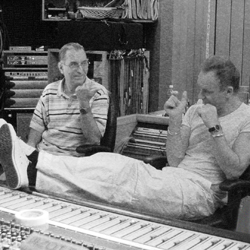
Darlington has been working on some really interesting projects of late, one of which was centered around four lads from Liverpool.
“I worked on this really cool Beatles covers project, where you can play along to all the tracks. So, for example, you can turn off McCartney and play the bass along with ‘She Loves You’,” he explains.
“Of course, these songs don’t exist in multitrack, so we created that track by track, and I was mixing against the real single, and I couldn’t quite get it. That’s when Waves came out with the REDD [modern vintage console] plugin. The minute I put that in, suddenly, there was the sound, right there! Just amazing.”
Other projects include Brazilian jazz trio fronted by Manhattan Transfer lead singer Janice Siegel, and a capella group Straight No Chaser, who are signed to Atlantic Records.
“They’re 10 guys straight out of college that have been very successful in a cappella, and they’re working on a new album; they’re recording now in Nashville, and we’re mixing as they go,” Darlington says.
“We just finished mixing a superb cover of Ike and Tina Turner’s version of ‘Proud Mary,’ in a medley with [Otis Redding’s] ‘Sittin’ on the Dock of the Bay’, and it’s just killer. That is such a great arrangement, and when you hear it in a capella, and they’re doing their own percussion and everything like that, it’s totally phenomenal, to be honest.”
“It’s funny. Everyone thought the Internet would be the demise of music, but for engineers, it opens up a marketplace all around the world. People in other countries find me through my website, and I can work remotely over the Internet. It’s a ripple effect, in terms of recommendations, also; we quote a price to mix a record, including a revision, which means people feel safer when shipping all their hard work over to someone they don’t know. It’s an amazing way of working, actually.”
He uses four sets of studio monitors: a big club system complete with subwoofer; a pair of Genelec 1031As; an old school pair of Yamaha NS10s; and a little Sony radio:
“It’s the Genelecs and the Yamahas that I really rely on. The Yamahas are very difficult to make things sound warm and attractive on, whereas the Genelecs basically sound great on almost everything you put in, so you don’t need to work as hard,” Darlington insists. “With the NS10s, you hear all the mids and transients at exactly the same time, so they always sound a little harsh, whereas with the 1031s, you can attenuate the highs via some knobs on the back if you need to, and they’re bi-amped and powered, so they offer something different.
“I tend to keep my room pretty flat though, and I have a guy who’s treated it really well. I also have a little Sony radio that I run off an old cassette deck as the amp, and it’s very low quality, but man it tells you a lot about how a pop record translates off of the big speakers! It’s a great reference point.”
I ask Darlington to leave us with some do’s and don’t’s in terms of working in the music industry. He laughs, and replies:
“You have to be a ‘can do’ guy, so basically, say yes, and worry about the rest later! I remember the owner of a new studio once said to me, ‘if you can learn this software, you can have the job’. It was Performer 1.4 software at the time, so I stayed the whole weekend in that studio to learn it, and I got the job! I find that true of most of the high end engineers I know; they were given the opportunity, and just jumped.
“Secondly, diversify: don’t be a hip-hop only engineer. Learn about jazz, classical, pop, singer-songwriter, how to make a crunchy guitar sound. Get your palette as wide as can be. Learn how to record a violin. That’s how I learned to love DPA microphones: I always use DPA 4099s and 4011s, the little omnis, and the DPA guys have really got the acoustic thing down, and they’re fantastic sounding. And on that kind of stuff, you just have to get the mics in the right place, and try never to EQ, as it’s purely about placement.
“Then thirdly, stick to your guns. There will be some lean times and some great times; when times are lean, you think no-one will care, but sooner or later, someone will call, or you’ll bump into someone on the street, and something will happen. Believe it will happen, and it will.”
Find out more about Dave Darlington here.
Headliner is a UK-based publication that supports the creative community, focusing on live performances, recording sessions, theatre productions, and major broadcast events. The spotlight is on the technology, but with a lifestyle approach. Find out more here, and subscribe here.
Headliner editor Paul Watson has 10 years of live touring experience with bands in the UK and the US, and ran an independent recording studio for five years close to London.
